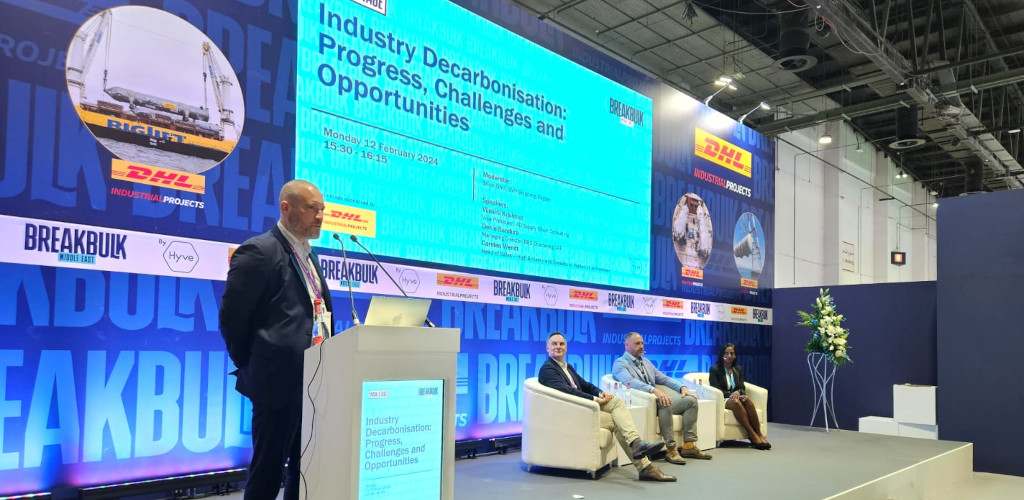Carriers, Shippers, Forwarders Need to be United

By Carly Fields
If the breakbulk industry is serious about decarbonization, multipurpose carriers need to invest, and customers need to support and contribute to green moves.
Speaking at Breakbulk Middle East in Dubai, Carsten Wendt, head of sales for high and heavy and breakbulk at Wallenius Wilhelmsen, said that while everybody wants green breakbulk shipping, nobody wants to pay for it.
“We have to agree that if we are serious about this it will cost money,” he said. “There is a change of mindset needed to get there.”
He also cautioned against falling into the trap of greenwashing and stressed the importance of taking a step-by-step approach to decarbonization. “Decarbonization is not a topic that goes away tomorrow.”
Wendt said that companies that are investing now will have the competitive advantage going forward, while others that have their “head in the sand” need to wake up to the reality. “As soon as you start investing in this, the better.”
Panelist Vilasini Krishnan, vice president of 4D Supply Chain Consulting, added that decarbonization in the industry is an “opportunity for all of us to come together and to work towards this goal.” Synergies will reduce the overall cost at the end of the day, she added.
Moderator Stian Omli, senior vice president of shipping at Esgian, noted that the whole concept of decarbonization had changed over the past 10 years. “The issue has moved from the engine room into the board room,” he said.
Denis Bandura, managing director of BBC Chartering UAE, added that it is a change for everyone. “It’s increasing the standards. It’s increasing the costs. It’s moving us toward as new competitiveness.”
Wallenius Wilhelmsen puts decarbonization at the core of its company strategy, Wendt said.
“We believe it is our social responsibility to decarbonize transportation. We do not want to wait for regulators to force something on to us. We would like to be the forerunner for decarbonization.”
Also, the way that major EPCs are shipping project cargo has already changed. While that shift might not have trickled down to the small to medium enterprises, “it is coming,” Krishnan said.
Bandura added that in his experience clients know and understand the need to decarbonize, “as they are moving towards the same goal. They may question the techniques – how to invoice, how to deal with it and so on, but all in all, they are quite understanding.”
However, one thing that is missing is transparency, Krishnan said. Without that, “clients then struggle to understand what they are paying for.”
Another issue is that a carrier can offset the carbon on a voyage, but there is no independent verification of that offsetting. “Unless you have a third party coming in and verifying, you can’t take it at face value,” she said.
Bandura added that meeting the requirements of the European Union’s Emission Trading System is challenging for MPV operators as the actual ship is not assigned at the time of booking, and some parcels may end up being combined which could alter the ship’s emissions profile.
Another emissions-related challenge is how to spread the costs around the clients. “Do we charge by freight, by units, by destination?” Bandura asked. “For us, we’ve just gone to the simplest way, establishing a way to calculate the approximate amount for the voyage.”
Join the conversation at Breakbulk Europe 2024, taking place on 21-23 May at Rotterdam Ahoy.
